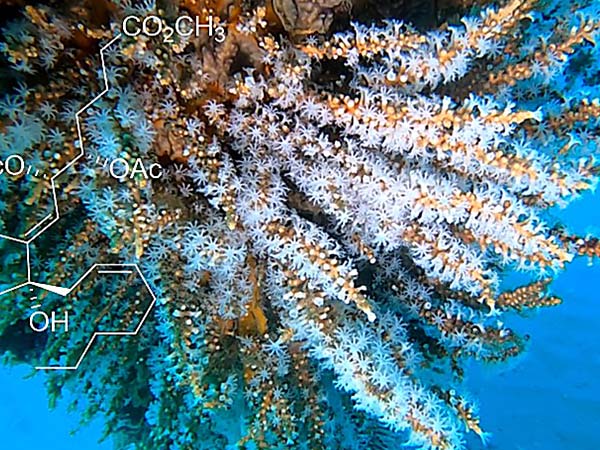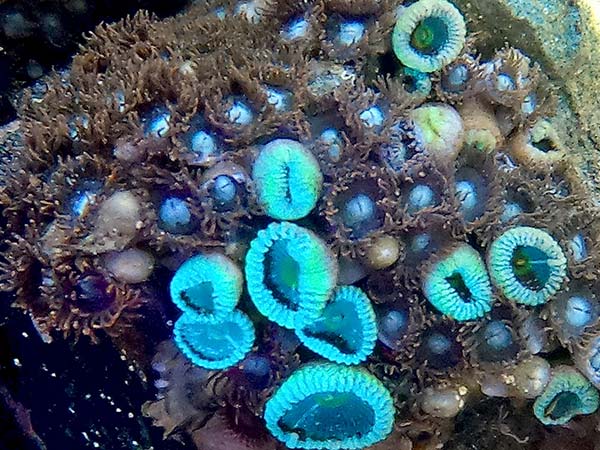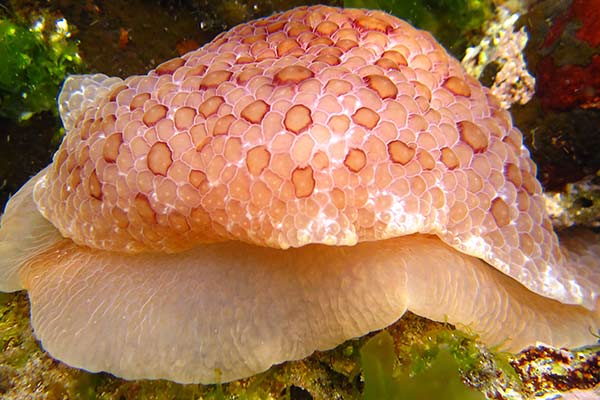Independent research broadens our scope and focus
Members of our centre also lead independent projects and collaborative research work, expanding our knowledge and impact into adjacent fields such as drug discovery and development of the 'blue economy’—the economic use of marine environments.
Marine Biodiscovery
Primary researchers: Professor Anthony Carroll – Marine natural products chemistry
Funding sources: Royal Society of Chemistry, external consultancies
Professor Tony Carroll leads a team that studies the Natural Products Chemistry of marine organisms. These studies are multifaceted and include drug discovery, chemical ecology, chemotaxonomy, invertebrate/microbe symbiosis, biofluorescence and bioluminescence, sunscreen discovery, ecotoxicology and cheminformatics.
As lead author on the flagship annual review of marine natural products published in the high-impact journal Natural Product Reports, Tony is a key leader of a large network of international researchers in the marine natural products field.
Marine biodiscovery to cure bacterial and protozoan infections, cancer and neurodegenerative diseases
Marine invertebrates, algae and microbes are rich sources of unique and diverse organic molecules. Our research utilises these marine bioresources to find new molecules to develop into treatments for bacterial and protozoan infections such as malaria, cancer and neurodegenerative diseases. We use cheminformatics and big data to aid in drug discovery. We also develop innovative nuclear magnetic resonance spectroscopic methods to identify new molecules in complex mixtures.


Marine biofluorescence and bioluminescence
Biofluorescence and bioluminescence are common features of organisms inhabiting the marine environment. This project aims to identify organism that contain fluorescent molecules, to characterise the structures of these compounds and to identify if they also have chemiluminescence properties. We aim to develop these fluorescent and luminescent compounds into probes to understand diseases mechanisms.
The identification and development of the next generation of sunscreens is an offshoot of this research.
Marine chemical ecology
We study the use of natural products by marine invertebrates (nudibranchs, ascidians, corals, sponges) to aid in their survival. Key areas of study include chemical communication, allelopathy and chemical defence mechanisms. These studies involve:
- identification of coral settlement factors in coralline algae
- the chemical basis of invasive species’ success on artificial reefs
- food and mate selection by nudibranchs.

Partnerships
The Institute for Biomedicine and Glycomics s a world-class research facility with a focus on early stage and pre-clinical drug discovery. The Institute is home to Compounds Australia and the NatureBank natural products library.
Discovery Biology’s Avery Lab works to design, develop and conduct high-throughput screening and high-content imaging assays for therapeutic biodiscovery across a diverse range of disease areas, including Cancer, Malaria and Protozoan infections.
Marine environmental management
Primary researchers: Professor Chris Frid – Marine ecosystems, marine conservation, human factors
Professor Chris Frid is a benthic ecologist with an interest the ecological function of sea floor systems and human impacts upon it. His recent work has focused on the long-term change in marine systems, including the role of climatic variation and the effects of fisheries. Much of this work has been impactful in the development of marine policy and in particular the application of holistic ecosystem perspectives and management in multiple sectors.
Chris is involved in significant collaborations with social and policy specialists working to integrate scientific evidence into maritime policy and management. He is the current Environment and Ecosystems Program Leader at Blue Economy CRC and the Treasurer of the Australian Marine Sciences Association.
Partnerships
The Blue Economy Co-operative Research Centre addresses the challenges of food and energy security, sustainability and provenance via sustainable offshore aquaculture, renewable energy production and ocean engineering in Australian and New Zealand ocean economic zones.
The Australian Marine Sciences Association is Australia's peak professional body for marine scientists from all disciplines and for more than 50 years has promoted all aspects of marine science in Australia.
Contact details
- Phone
- (07) 5552 7269
- Location and postal address
- Coastal and Marine Research Centre
- Room 2.01, Building G51
- Griffith University
- Gold Coast, Queensland, 4222